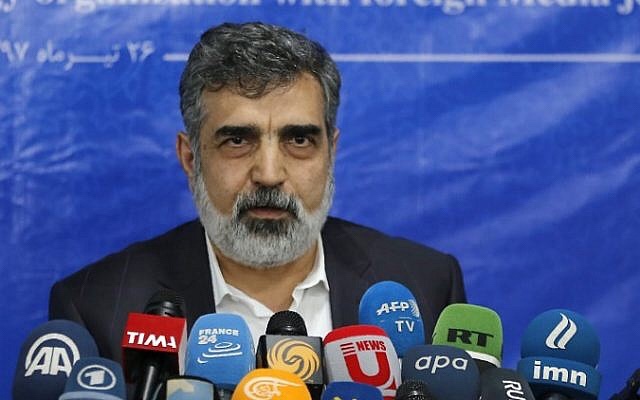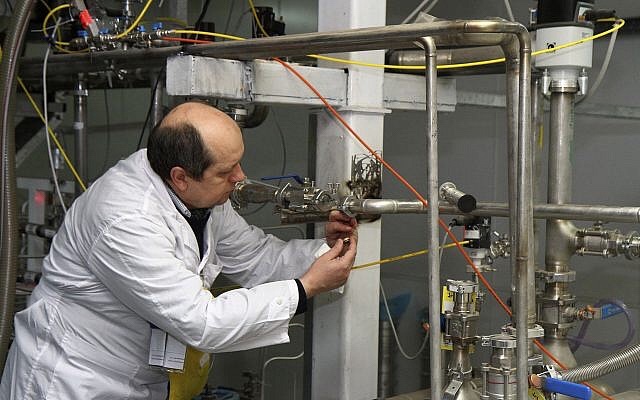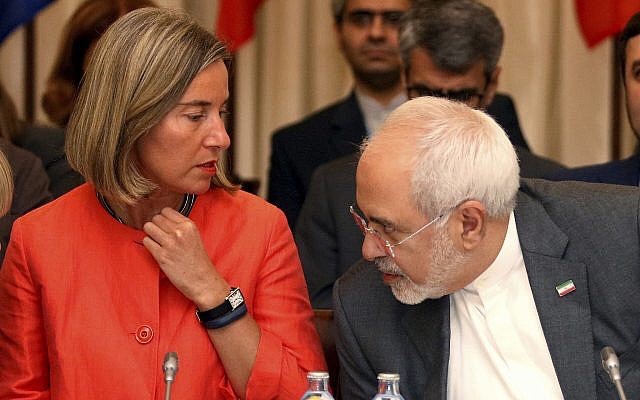
Iran taking back enriched uranium it sent out to Russia under nuke deal
Energy official says re-imposed US sanctions forcing Islamic Republic to return to nuclear fuel sources for domestic power needs
By TOI staff
11 Aug 2018, 11:26 pm
Iran on Saturday announced it was taking back another portion of the 20 percent enriched uranium stockpile it handed over to Russia as part of the nuclear deal signed in 2015 with world powers in exchange for sanctions relief.
Spokesman and vice-president of Iran’s Atomic Energy Organization Behrouz Kamalvandi said the re-imposition of US sanctions following President Donald Trump’s exit in May from the accord necessitated returning the uranium for domestic needs.
“If the fuel is sold to us, we do not need to produce it by ourselves,” Kamalvandi said, according to the semi-official Fars news agency.
“If the nuclear deal remains alive, the other sides should sell us the fuel and if the nuclear deal dies, then we would feel unimpeded to produce the 20% fuel ourselves,” he added.
Kamalvandi said Iran stopped producing 20% enriched uranium and transferred its stockpile to Russia in ten batches as per the 2015 deal. He said Russia had already returned one batch of the fuel earlier this year at Tehran’s request, and a second would be returned soon.
The multi-national accord brokered by the Obama administration stipulated that Iran ship out all but 300 kilograms (over 660 pounds) of its almost nine-ton stockpile of low-enriched uranium. Low-enriched uranium is suited to generate electricity but can be further enriched to arm nuclear warheads.

Illustrative: An unidentified International Atomic Energy Agency inspector cuts the connections between the twin cascades for 20 percent uranium enrichment at the Natanz facility, some 200 miles (322 kilometers) south of the capital Tehran, Iran, Monday, January 20, 2014. (AP/IRNA, Kazem Ghane)
In May, the US announced it was abandoning the 2015 agreement and reimposing nuclear-related sanctions, threatening global companies with heavy penalties if they continue to operate in Iran.
In a bid to salvage the accord, the EU and European parties to the deal — Britain, France, and Germany — presented a series of economic “guarantees” to Iran last month, but they were deemed “insufficient” by Tehran.
In recent weeks, Iran has prominently displayed its centrifuges and threatened to resume enriching uranium at higher rates. At one point, Iranian President Hassan Rouhani renewed a long-standing Iranian threat to close off the Strait of Hormuz, through which a third of all oil traded by sea passes.
US sanctions that had been eased by the Obama administration under the deal took effect again Tuesday, targeting US dollar financial transactions, Iran’s automotive sector, and the purchase of commercial planes and metals, including gold. Even stronger sanctions targeting Iran’s oil sector and central bank are to be re-imposed in early November.
Trump has offered talks on a “more comprehensive deal” but Iran has balked at negotiating under the pressure of sanctions and has instead leaned on its increasingly close ties with fellow US sanctions targets Turkey and Russia.
Iranian Foreign Minister Mohammad Javad Zarif told the conservative Tasnim news agency on Saturday there are no plans to meet with US Secretary of State Mike Pompeo or other US officials on the sidelines of the UN General Assembly in New York next month, which both Rouhani and Trump are due to attend.

European Union High Representative for Foreign Affairs Federica Mogherini and Iranian Foreign Minister Mohammad Javad Zarif, from left, wait for the start of a bilateral meeting, as part of the closed-door nuclear talks with Iran at a hotel in Vienna, Austria, Friday, July 6, 2018. (AP Photo/Ronald Zak)
“On Trump’s recent proposal [of talks], our official stance was announced by the president and by us. Americans are not honest and their addiction to sanctions does not allow any negotiation to take place,” Zarif told Tasnim.
It was Iran’s most explicit rejection of renewed nuclear talks to date, after much speculation that economic pressure would force its leaders back to the table with Washington or at least to engage in backroom discussions in New York.
No comments:
Post a Comment